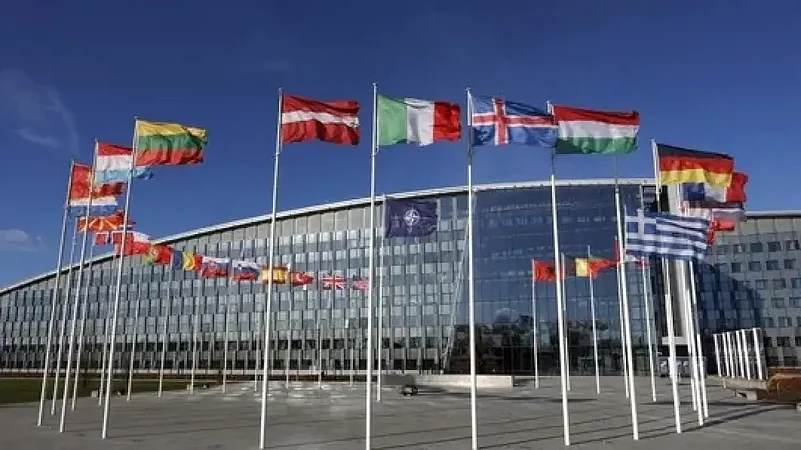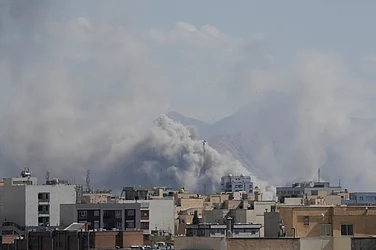NATO announced Friday that it is beefing up its troop presence in Kosovo after four people were killed in a weekend shootout and as the U.S. expressed concern about a buildup of Serbian forces along the border of its former territory.
Kosovo's prime minister welcomed NATO's decision, saying that Sunday's attack, involving around 30 gunmen, is a new sign that Serbia wants to destabilize its former southern province with the help of ally Russia.
These people want to turn back time," Prime Minister Albin Kurti told The Associated Press. "They are in search of a time machine. They want to turn the clock back by 30 years. But that is not going to happen.”
NATO launched a bombing campaign on Serb positions to halt a crackdown on separatist ethnic Albanians in Kosovo and end their 1998-99 war. The war left around 10,000 people dead, mostly Kosovo Albanians.
Earlier on Friday, Kosovo police raided several locations in a Serb-dominated area of the country's north, where the weekend violence left one Kosovo police officer and three Serb insurgents dead, raising tensions to a boiling point.
Police said in a statement that they were conducting searches at five locations in three municipalities linked to Sunday's shootout in the village of Banjska in northern Kosovo. It was one of the worst confrontations since Kosovo broke away from Serbia in 2008. Belgrade refuses to recognize it as independent.
NATO, which leads the KFOR peacekeeping force there, said Friday that extra U.K. troops would be placed under KFOR command “if needed, to address the current situation.”
“We need NATO because the border with Serbia is very long and the Serbian army has been recently strengthening its capacities and they have a lot of military equipment from both the Russian Federation and China,” Kurti said.
In Sunday's attack, about 30 masked men opened fire on a police patrol near Banjska before breaking down the gates of a Serbian Orthodox monastery and barricading themselves inside with the priests and visiting pilgrims. The 12-hour shootout that followed left one police officer and three gunmen dead.
John Kirby, spokesman for the White House National Security Council, said the attack was “well-coordinated and planned,” adding that the size of the weapons cache found during the attack threatens the safety of Kosovo officials and international personnel, including NATO troops.
“Everyone who was involved in planning and carrying out this attack needs to be brought to justice,” he said.
Kirby also said U.S. officials were monitoring a large deployment of Serbian troops along the border with Kosovo, describing it as an “unprecedented staging of advanced Serbian artillery, tanks and mechanized infantry units.”
Serbian President Aleksandar Vucic denied that there has been any buildup.
In a separate interview with the AP, Kosovo President Vlosa Osmani hailed NATO's decision to bolster its forces. Both Osmani and Kurti described the weekend violence as an “act of aggression” against Kosovo and demanded that Serbia be punished.
Osmani said the international community must not only condemn the attack “but then also, after they complete their internal procedures of confirmation of information, undertake clear measures against Serbia.”
Osmani referred to Vucic as a “proxy” of Russia counterpart Vladimir Putin: “And it is very clear now to everyone, even to those that had any doubt, that he is playing out Russia's plan in the Western Balkans.”
In Belgrade, Vucic said he had spoken on the phone with U.S. Secretary of State Antony Blinken, and they “agreed that de-escalation is needed" along with a greater role for KFOR.
NATO's decision to reinforce KFOR is “good news,” said Vucic. He insisted that at least one of the three Serbs killed was “liquidated” after surrendering and promised that Serbia will “prosecute the cold-blooded killers.” The insurgents, he said, are ordinary people who rebelled to “protect their homes.”
“I will not call the Serbs terrorists,” Vucic said. “I don't care what anyone in the world thinks.” European Union officials have described events over the weekend as a “terrorist attack.”
The violence further raised tensions in the Balkan region as EU and U.S. officials struggle to broker a deal to normalize ties between Serbia and Kosovo.
According to Serbian media, Kosovo police raided a hospital and a restaurant in the Serb-dominated part of the town of Mitrovica on Friday, as well as locations in other towns. The local Kossev news agency said officers confiscated several vehicles.
After the weekend attack, Kosovo police said they had found huge quantities of weapons and equipment that suggested the insurgents had planned a wider operation. Some of the vehicles used had KFOR insignia.
A few hundred troops from the U.K.'s 1st Battalion of the Princess of Wales's Royal Regiment are now available to KFOR. Around 500 troops were deployed from Turkey in June after dozens of KFOR personnel were hurt in riots in northern Kosovo.
"We will always continue to make sure that our commander has the resources and flexibility necessary for KFOR to fulfill its mandate,” NATO Secretary-General Jens Stoltenberg said. “We stand ready to make further adjustments to KFOR's posture as required.”
KFOR currently consists of around 4,500 troops from 27 NATO and partner countries.
Part of the mission's work has been deterring hostility or threats against Kosovo by Serb forces. KFOR has said that it closely monitored the weekend's developments, but did not intervene as it received no request from Kosovo authorities.
On Thursday, Kosovo's interior minister, Xhelal Sveçla, alleged in an interview with the AP that Serbia operates training camps for insurgents and said that Kosovo authorities were also investigating Russia's involvement in the violence.
There are fears in the West that Russia, acting through Serbia, may want to destabilize the Balkans and shift at least some of the attention from Moscow's full-scale invasion of Ukraine. Russia has voiced support for Serbia over the clashes, blaming the West for allegedly failing to protect Kosovo Serbs.

















